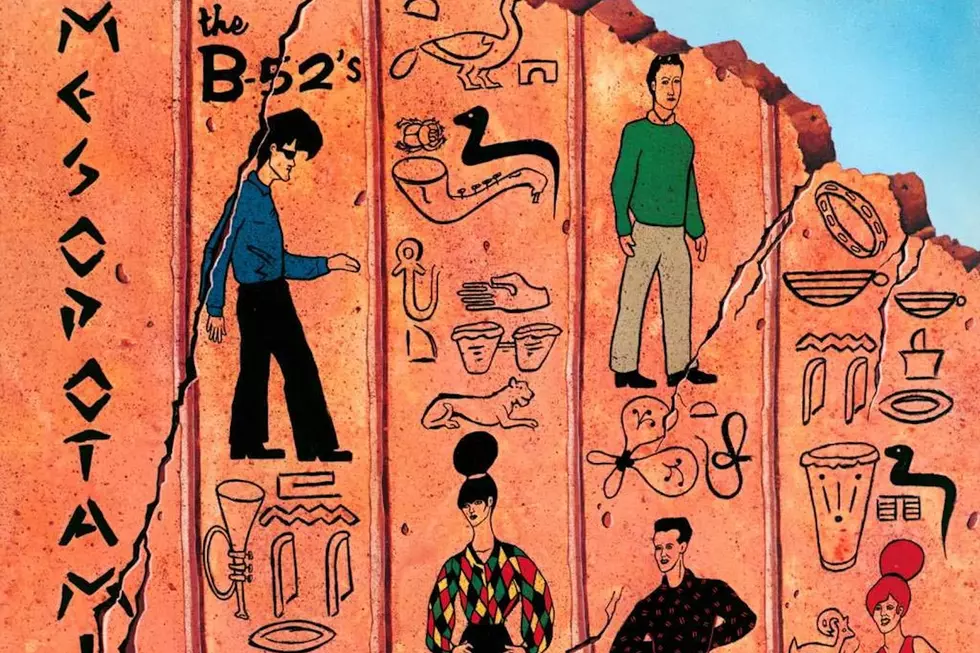
40 Years Ago: Why a B-52’s Collaboration With David Byrne Fizzled
The B-52's weren't prepared to capitalize on their earliest successes. A 1979 self-titled album and 1980's Wild Planet had used up all of their pre-existing songs. They'd have to come up with something new.
Yet the timing could have been perfect: The B-52's were growing weary of their techno-glo party-band image.
"I really do feel trapped," late guitarist Ricky Wilson told Rolling Stone in 1980. B-52's manager Gary Kurfirst "was talking about our next album, and I mentioned that it might not be a dance record, and he was so shocked by that idea. It's shocking to me that people really do expect that of us now."
They holed up in an upstate New York house to write, while Kurfirst secured the producing services of former touring mate David Byrne to help guide the B-52's into uncharted waters. It seemed like a match made in new wave heaven.
"The Talking Heads had their own style; they were like nobody else," singer Cindy Wilson remembered in 2017. "Back in those days [the venues] paired groups, and we loved going out with them because they were friends and buddies, and a really fun group."
But Byrne was then at work on The Catherine Wheel, a musical score commissioned for a Twyla Tharp dance project. He'd have to split duties, collaborating on the Tharp project during the day and with the B-52's at night. Still, Kurfirst insisted – so the sessions moved forward.
"We weren't really ready to put out this album, and Gary had suggested working with David Byrne, but we hadn’t written all the songs out," singer Kate Pierson told the AV Club in 2011. "He said, 'You gotta put another record out!' He was one of those managers who was, 'Ya gotta do this! Ya gotta do that!' So he kind of forced us."
Listen to the B-52's Perform 'Cake'
Ultimately, the pressure from all sides became too much. Island Records - the band's U.K. label - was growing increasingly impatient, Byrne was burning the candle at both ends, and the exhausted B-52's couldn't will themselves to create enough songs for a new album.
"The writing between Wild Planet and Mesopotamia was a real difficult period," drummer Keith Strickland said in 2016's Party Out of Bounds: The B-52's, R.E.M. and the Kids Who Rocked Athens, Georgia. "The honeymoon was over. The fascination with being in a band, being successful – we'd already done it by that time. And at a level far beyond what we expected. We'd bought a house in Mahopac and were all living there together – and that created a strain on us, all living in one house together."
They settled on producing a stopgap six-song EP instead but ended up releasing Mesopotamia on Jan. 27, 1982, before some of the songs were completed.
"We hadn't even finished," Pierson admitted. "'Cake' wasn't really finished. 'Deep Sleep,' I just kind of stuck that lyric on in the studio in one take. It was just not finished. We sometimes think, 'Wow, if only we could go back and finish Mesopotamia," she added with a laugh.
Nothing came easy, not even deciding which of the remaining scraps would be included.
"Strangely enough, [label head] Chris Blackwell didn't want to put 'Mesopotamia' on Mesopotamia," Pierson told AV Club, with a laugh. "But 'Mesopotamia' was actually a finished song, and we're like, 'Chris doesn't want to put "Mesopotamia" on Mesopotamia?' I still think it's one of our best songs – and despite what Chris said, we never hesitated about putting in on there. We never thought, 'We're not putting this out.' We were always, like, 'Oh, yeah, we're putting 'Mesopotamia' on Mesopotamia."
Listen to the B-52's Perform 'Mesopotamia'
A mad rush to issue Mesopotamia led to printing issues, as Island Records accidentally included rough demo-style mixes of "Loveland," "Cake" and "Throw That Beat in the Garbage Can." The label quickly pulled those early pressings, but the updated EP still often had little in common with what came before.
The fun vocal interplay of earlier B-52's projects was largely absent, replaced by angular, far darker textures from analog synths and occasionally ill-fitting Remain in Light-style rhythm patterns. The retracted demos hinted at still darker, still more angular earlier attempts (at least by B-52's standards).
It all ended up sounding as unfocused and frankly depressed as the B-52's were. "In 1980, we'd done like nine months of touring, and we were overwhelmed, overworked, just kind of worn out with the whole thing," Strickland said in Party Out of Bounds. "We were ready for a rest. It had really become work, and the fun and spontaneity of it was gone – definitely gone."
The B-52's eventually regrouped with reggae- and dub-inspired producer Steven Stanley for 1983's Whammy!, quickly reimagining three of the abandoned tracks from the Mesopotamia sessions into something more suitably retro and nervy. Their brief experiment with seriousness had been abandoned.
Mesopotamia crept into the Top 40 in the U.S., and went Top 20 in the U.K., but was soon essentially disowned by the group and its fans – that is, except for its initially overlooked title track.
"Mesopotamia" instead remained a staple of B-52's set lists, after garnering scattered pockets of support with the help of local DJs like the Electrifying Mojo in Detroit. "We still get a big cheer whenever we play 'Mesopotamia' there," Pierson told the AV Club.
"By the way, the line 'meet you by the third pyramid,' there was some translation of the song into Japanese where it became 'meet you by the fur pyramid,'" she noted. "I always thought that was genius!"
Ranking Every B-52's Record
More From 99.1 The Whale










